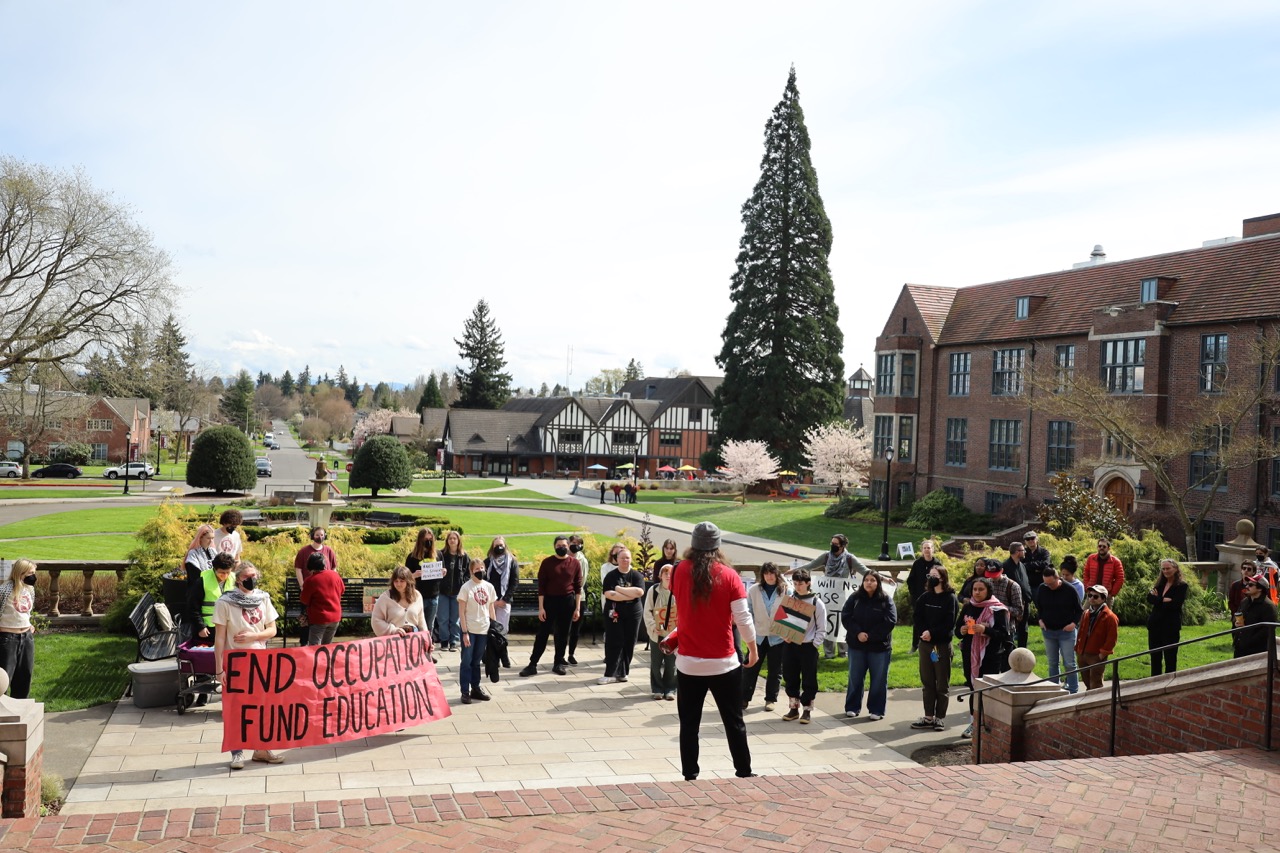
By Tate DeCarlo
The outcome of the University’s investigation of student protest during Rep. Kilmer’s Feb. 21 lecture remains uncertain. No additional information regarding the investigation – managed by Seattle firm Davis Wright Tremaine (DWT) – has been released since Mar. 22, yet campus activists persist in their campaign against the genocide in Gaza, as well as the University’s ongoing investigation of student protestors. On Mar. 29, the Students for Democratic Society (SDS) held a rally in front of Jones Hall, demanding that University of Puget Sound administrators release all investment information, materially divest from Israel, and take their “Hands off the student movement.”
Regarding the outcome of the investigation, President Crawford’s most recent email to the campus community on Mar. 18 states that investigators will try to conclude their review by the end of the semester.
In the past, investigations into student conduct would be handled by the Office of Student Accountability and Restorative Practices. Director of the office, Amy Gauthier said in an email to The Trail that “The University thought it was important to work with a third party investigator to alleviate any bias that may have been present.”
Despite an outside law firm leading the investigation, the Office of Student Accountability and Restorative Practices and its Student Integrity Board will still be involved in the reconciliation process. This is in accordance with usual proceedings, as the Student Integrity Board does not participate in the investigation process; instead, “The board is responsible for hearing the case after a student has been presented with alleged Student Integrity Code violations,” according to Gauthier.
Gauthier clarifies that consequences for students found in violation of University Policies in the investigation are varied. “Sanctions can range from Conduct Reprimand to Suspension. The board also has the opportunity to come up with some educational sanctions,” she said.
As SDS protest against the Palestinian genocide continues, Picardo offers suggestions to student demonstrators in order to ensure their actions remain within University policy guidelines. “I would encourage protestors to be informed about university policies and community standards related to protests, demonstrations and material disruptions, and to work collaboratively with staff,” she said.
Picardo emphasized that such practices are necessary given her belief that demonstrations like the disruption of Rep. Kilmer’s Feb. 21 lecture set a harmful precedent. “If the university were to tolerate material disruptions to university events, then any speaker on campus – including faculty lectures or classroom teaching, administrative meetings, student rallies or protests – is subject to being shouted down, having their speech suppressed, and having their safety threatened,” she said.
Though Picardo clarifies that “protestors do not have the right to infringe on the rights of others including being violent, intimidating, discriminatory, or making credible threats,” she stated, “I admire the passion and deep feeling that students bring to sharing their perspectives and opinions about the challenging issues facing our world today.”
Admiration for the student body’s efforts was echoed by chemistry professor Steven Neshyba, who spoke at the Mar. 29 demonstration. In his speech, Neshyba commended the student body for their continued efforts, especially given fears of suppression due to the University’s investigation. He emphasized that, historically speaking, student activists have long been ahead of public opinion, and that the value of student protest has been demonstrated by its positive impact on social justice movements of the past. “The Civil Rights Act of 1964 came into being partly because of the passions of students like you, passions felt so strongly that they overcame their fears – of which there were many. Your passion for justice, and the civic engagement that you have chosen to rise to, are in that tradition, and are fundamental parts of Liberal Arts,” Neshyba said. “If there is a silver lining in this, it is this: it took years for the tide of public opinion to align with student protestors of the 1960s. That tide is turning much faster now.”
Neshyba also urged those in attendance to continue engaging in activism on campus with compassion, reminding students to empathize with staff members who fear for the security of their positions due to the concern that student protests may impact the University’s image and deter future enrollment at the University Neshyba also addressed University staff and faculty, urging them to recognize the value of students’ pursuit of justice regardless of the discomfort it may make them feel. “I also hope for compassion from faculty and staff, for students who are pursuing justice, even if it is done in a way that they might not be comfortable with – and there are faculty committees who are working on this idea right now,” he said.
During the demonstration, members of SDS led chants and gave speeches updating the University community on the genocide in Palestine. Speakers claimed that although President Crawford released information about the University’s investments in an email on Mar. 25, the language utilized to discuss these investments was vague and minimizing; SDS continues to demand that the University share the names of the specific companies and organizations in which they are invested, and that the institution transition to investment in alignment with the Boycott, Divestment, and Sanctions (BDS) movement. SDS members also pointed out that although investments in defense and associated those with Israel make for less than 1% of the University’s portfolio respectively, these still account for significant monetary values due to the size of the University’s endowment.
In addition to student protesters, several professors were in attendance, as well as members of the Tacoma branch of the Freedom Road Socialist Movement (FRSM). FRSM provided organizational support with a small security team and an aid cart with snacks for attendants. At the protest’s close, a banner was hung from a window above the entryway to Jones emphasizing SDS’s demands that the University “1. Release Investments, 2. Divest from Israel, and 3. End the Investigation.”
